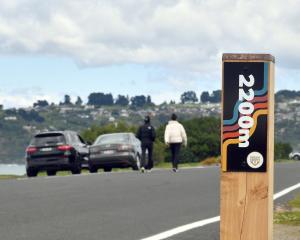A mother grieving for her younger daughter, killed in a car accident on the way to Fashion Week last year, has acknowledged the close friend responsible was also suffering.
Millie Constance McCutcheon, 20, of Dunedin, was driving her father's car near Morrinsville last August 31 when she failed to see a truck and trailer unit almost stopped in front of her and ran into the back of it. Her passenger, 20-year-old Felicity Paige Wren, was severely injured and died.
The two young women were flatmates and close friends, a fact Ms Wren's mother, Anne, mentioned in the victim statement she read in the Dunedin District Court yesterday when McCutcheon was sentenced for causing Felicity Wren's death by driving carelessly on State Highway 27 at Patetonga.
Mrs Wren said she knew Millie was suffering. And there was nothing the court could impose as a penalty that could come close to "what Millie has to live with every day, for the rest of her life".
"We hope she can find a way to move forward but realise that will take a long time."
In the statement from herself and her husband, Mrs Wren spoke of the shock and disbelief when told their youngest child had been killed, two and a-half months short of her 21st birthday. They were a few days into an overseas holiday at the time.
She described their younger daughter as uncomplicated, happy, smiley, beautiful "inside and out" with the rare gift of being "a listener", a quality that brought her many friends. She was studying photography at Massey University in Wellington and was excelling.
Mrs Wren said it was difficult to accept their expected future with the daughter "mostly known as Fliss" had gone - her career, marriage and grandchildren - that was something that would never go away from them. And although it was five months since the accident, it still felt "very raw" to them. Some days they were still in disbelief. It had not got easier with time.
"If anything, it feels harder as this is the longest we have ever have gone without talking to Fliss or seeing her."
They would talk two or three times a week, catch up on Facebook and on visits home or to Nelson to visit family together or to Wellington.
While her husband had gone back to work, she had not been able to do so, Mrs Wren said.
She often had moments of "absolute grief or quiet tears every day". Learning to adapt and cope with the effects of such a tragic event in their lives was an ongoing process.
Sometimes they coped well and, at other times, "the grief just swallows you up". They had a "magnificent" support group of family and friends, "but ultimately you have to learn to cope for yourselves" .
They had gone through "some of those terrible firsts" - their daughter's 21st, Christmas and New Year - with family around. But there was an enormous hole - "a Fliss-shaped hole" - where she should have been, and it would never be filled.
Tidying up her daughter's affairs been particularly difficult, Mrs Wren said. It was hard being pragmatic and businesslike when talking about a daughter's life and death.
The Wrens were critical of the state of New Zealand roads, that vehicles could stop on a busy main highway without anywhere to pull over first.
"I have seen this more and more and am certainly a very nervous passenger now," Mrs Wren said.
Judge Michael Crosbie thanked the couple for their courage in reading their statement in court. He said it was important for Millie to hear it too. As a parent with children of a similar age, he said he could "only imagine" what the family was going through.
Having earlier indicated he would be imposing no penalty other than a conviction and a driving ban, the judge said the charge of careless driving causing injury or death was the lowest level of culpability that existed in law, where a moment's inattention, a very sudden fall from the standard of being a reasonably prudent driver, could have "incredibly tragic results".
Because of that, Parliament recognised people "can and do make mistakes".
"In cases like this, the law appears a very blunt instrument," he told the families of both young women.
He agreed this country's roads could be "very unforgiving places".
He convicted McCutcheon and disqualified her for one year and one day. No penalty was necessary.
"That's the message from Mr and Mrs Wren," he told the tearful defendant.
And he said he was confident she would learn from the experience and endure what had happened.












